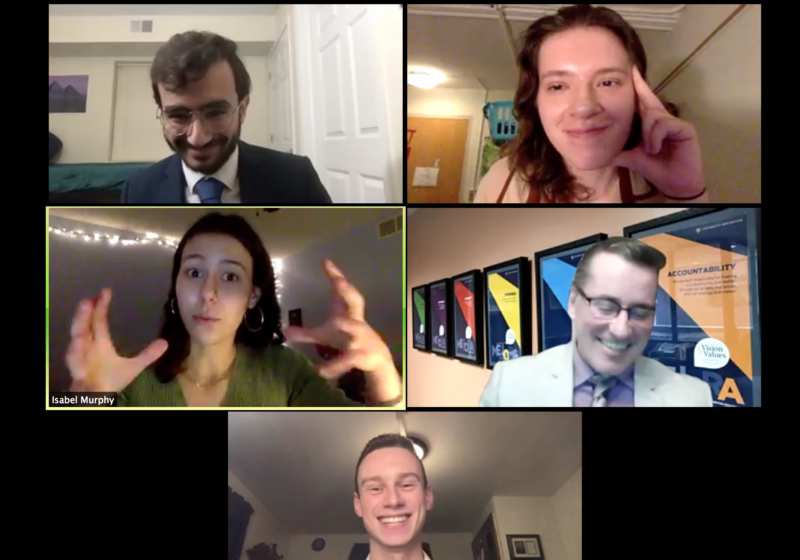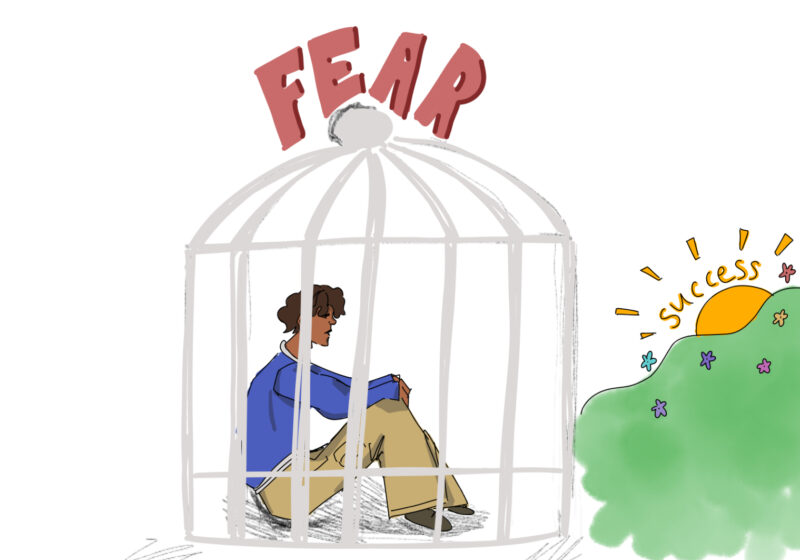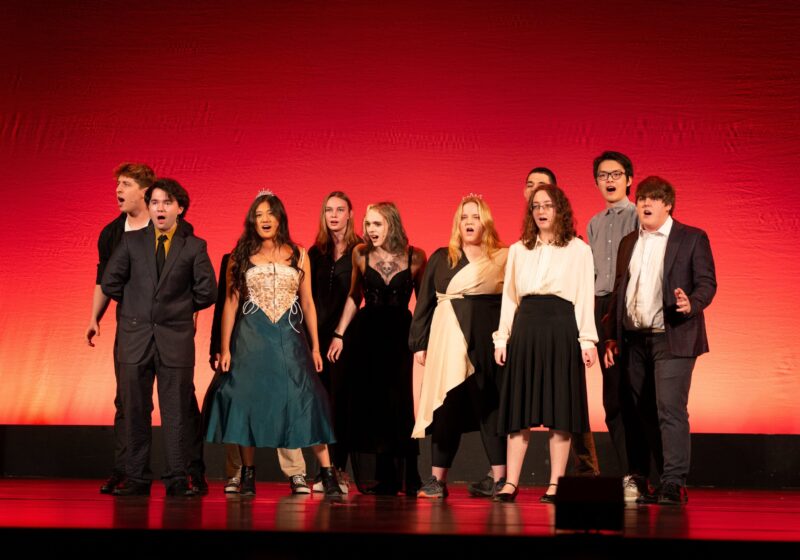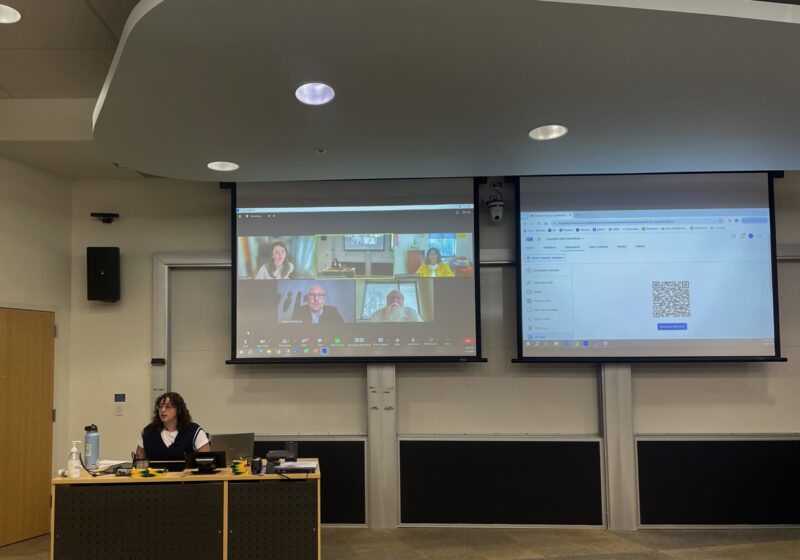In UR’s first-ever SA presidential debate over Zoom, juniors Justyna Gorka and Marc Haddad emphasized government reform and community outreach, while sophomores Ian Krager and Isabel Murphy made promises to crunch data and unite campus efforts.
The debate pitting Gorka and Haddad against Krager and Murphy (presidential and vice-presidential candidates, respectively) began at 7:30 p.m. on Thursday.
On Restructuring SA
The starkest contrast between the two teams was their opinions on SA’s ability to effect change under its current structure.
Restructuring SA is a key campaign point for Gorka and Haddad. Gorka praised the passion of SA members but said that the passion does not always translate into results, pointing to stagnation on improving mental health resources and campus accessibility. “We have passed these [resolutions] before, done the research, and yet we still have these problems,” she said.
Their proposed changes include creating an SA position to oversee implementation of passed legislation, institutionalizing office hours for SA executives and senators, and creating a UR committee to gather information on significant campus conflicts.
Krager said SA’s issues were caused more by a lack of leadership than by structural deficiencies, and highlighted the need for decisive leadership that could unify its operations.
Murphy spoke of a need to change SA’s culture so that there was “constant communication between the executive and legislative branches,” and to make the government more representative of the student body.
On Mental Health
Concerns over mental health support and resources featured heavily in the debate, with both tickets marking it as a priority for their presidency.
Murphy called for a campus culture more conducive to mental health.
“I’ve felt this pressure, I’m sure everybody watching has,” she said. “You need to be a part of as many things as possible. Build your resume and keep on going even when you feel like you can’t.”
She said she planned to start a dialogue around this culture, and that her team was exploring the possibility of funding assistance for low-income students with counseling needs.
Krager said that if elected, he and Murphy would bring all ongoing efforts addressing mental health to one table and draft a University-wide report. “Students can’t be successful inside the classroom if they’re not doing well outside the classroom,” he said.
Gorka rattled off numerous ideas to provide low-level mental health training to Residential Advisors and International Student Mentors, to hire more UCC counselors to deal with lagging response to student need, and providing transportation for those attending therapy off campus. These ideas, she said, were based on conversations they had had with students where they had heard of people waiting up to three months for their first appointment with UCC.
Haddad highlighted the intersection between diversity and mental health, saying that, depending on their background, students may not know how to reach out about their mental health.
“A lot of my Mediterranean friends don’t even know how to start that conversation,” he said. “We’re not really sure how to talk to other people about our problems.” Haddad added that LGBTQ+ students had spoken to their team about encountering bias from counselors, an issue he hoped to work on with UR’s Vice President of Diversity and Inclusion.
On Diversity & Inclusion
Krager, who stressed equity in his opening remarks, said he would fight for incidents of racism and xenophobia to be taken as seriously in UR’s Code of Conduct as incidents of drug or alcohol abuse. He also called for mandatory cultural competency training for first-year students, and said he would stay in contact with minority communities to hear their ideas.
Gorka said she would create more minority student liaisons within SA, and spoke of plans to work with the Burgett Intercultural Center to host events that would “emphasize the culture that is on this campus.” She also mentioned the possibility of introducing mandatory safe zone training for students on executive boards.
On Student Outreach
Gorka referenced a track record of engaging students as a senator and said she would continue to prioritize student outreach if elected.
At least 60 students and some administrators helped shape Gorka and Haddad’s proposed policies, she told the Campus Times later. The team has released online feedback forms, and as it is possible to leave suggestions on their extensive policy working document.
Murphy said as vice-president she would focus on connecting students with SA, as well as people working on similar projects. Krager said he would hold more events where students could walk up to SA members and talk, and suggested changing the location of senate meetings from Gowen to a less “intimidating room.”
On how to fund new initiatives
Gorka and Haddad stressed increasing transparency around how student tuition is allocated so that students are aware of all benefits they are entitled to and can have conversations about where they want their money to go. Gorka gave the example of the tampon and pads initiative which was first funded by SA’s 5k challenge but now is funded by the University.
Murphy agreed with increasing tuition breakdown transparency, and Krager said he would push for the SA president and vice-president to be able to lobby for state funding on certain programs in an official capacity.
On COVID-19
Both teams admitted that despite their ideas to shake up campus, their first priority next semester will be helping students re-adjust and heal from the unprecedented changes wrought by the coronavirus pandemic.
“The first thing I would address is how to bounce back from this,” said Haddad, in a response that other candidates echoed. “Because we can’t just assume that everyone’s going to come into the fall semester perfectly well, perfectly healthy.”
Watch the full debate here.







